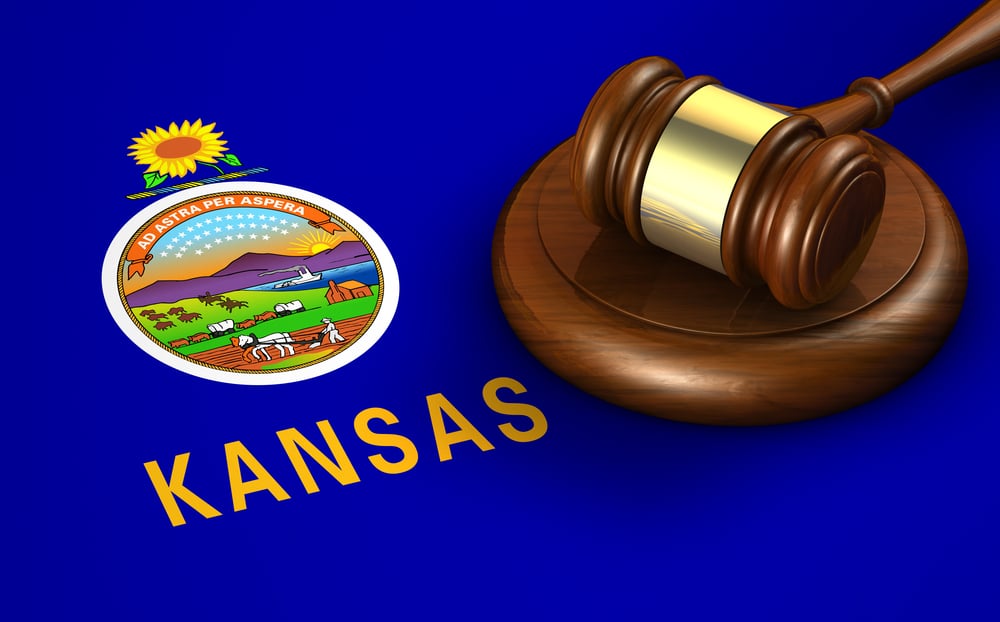
Kansas enforces strict Driving Under the Influence (DUI) laws with a per se blood alcohol concentration (BAC) limit of 0.08% for drivers 21 and over, and 0.02% for drivers under 21. The state operates under implied consent laws, requiring drivers to submit to chemical testing when requested by law enforcement with reasonable grounds to suspect impairment.
Law enforcement agencies across Kansas coordinate efforts between state highway patrol, county sheriffs, and local police departments. The state’s geographic diversity, from urban centers to rural agricultural areas, requires adaptable enforcement strategies and specialized training for officers.

0.08% or higher for regular drivers and 0.04% for commercial drivers

Yes

30 days

Mandatory

Yes (0.15%+)
Kansas presents a varied DUI landscape reflecting its mix of urban areas, suburban communities, and extensive rural regions. The state’s position along major interstate highways creates significant through-traffic, while agricultural communities face unique challenges with seasonal variations in drinking patterns and enforcement needs.
The presence of multiple military installations, universities, and agricultural centers influences both enforcement strategies and prevention efforts. Weather conditions and seasonal agricultural activities impact both drinking behaviors and law enforcement response capabilities.
First-time DUI offenders in Kansas face minimum 48 hours in jail or 100 hours of community service, fines between $750 and $1,000, and license suspension for 30 days followed by restricted driving privileges. The state employs a 10-year lookback period for determining repeat offenses.
Second offenses carry minimum 90 days imprisonment and fines up to $1,750, while third and subsequent offenses result in felony charges with potential imprisonment up to one year. Additional requirements include mandatory alcohol and drug evaluation, treatment programs, and ignition interlock devices for specified periods.
Kansas imposes enhanced penalties for DUI offenses involving aggravating factors such as high BAC levels (0.15% or greater), accidents resulting in injury or death, and the presence of minors in the vehicle. These circumstances can result in felony charges carrying substantial prison terms and fines.
The state maintains specific provisions for commercial drivers, who face stricter BAC limits of 0.04% and severe professional consequences. Additional considerations apply to cases involving farm equipment operation and agricultural workers during harvest seasons.
Kansas law enforcement utilizes a multi-faceted approach including regular patrols, saturation patrols, and sobriety checkpoints. Officers receive specialized training in DUI detection and standardized field sobriety testing, with emphasis on both alcohol and drug impairment recognition.
The state coordinates enhanced enforcement efforts during high-risk periods such as holidays, major sporting events, and local festivals. Special attention is given to rural roads and agricultural areas during harvest seasons when impaired operation of farm equipment becomes a heightened concern.
Kansas employs state-certified breath testing instruments for both preliminary screening and evidentiary testing. Fixed testing locations at county jails and police stations provide certified equipment for accurate BAC measurement, while mobile testing units serve rural areas.
The state maintains certified laboratories for blood and urine testing, with established protocols for sample collection and chain of custody. Modern technology including body cameras and dashboard recordings supplements traditional detection methods, providing additional evidence for court proceedings.
Kansas offers a range of treatment options through certified providers, including education programs, outpatient counseling, and intensive residential treatment. Programs must meet state certification requirements and demonstrate effectiveness in reducing recidivism.
The state emphasizes accessibility of treatment services, particularly in rural areas, through regional treatment centers and mobile services. Programs incorporate evidence-based practices while considering local needs and resources, including specialized services for agricultural communities.
Kansas requires all DUI offenders to complete alcohol and drug evaluations within specified timeframes following conviction. Treatment recommendations follow standardized assessment protocols, with program requirements varying based on offense severity, substance abuse history, and risk assessment outcomes.
The Kansas Department for Aging and Disability Services oversees treatment provider certification and program standards. Mandatory components typically include substance abuse education, counseling sessions, and may include intensive outpatient or residential treatment for higher-risk offenders.


Kansas implements comprehensive monitoring through probation departments, courts, and treatment providers. The state utilizes various tools including random drug and alcohol testing, scheduled check-ins, and ignition interlock devices to ensure compliance with court-ordered requirements.
Violations trigger swift consequences, potentially including jail time, extended probation periods, or additional treatment requirements. Electronic monitoring systems and remote breath testing devices supplement traditional supervision methods, particularly in rural areas.
Kansas operates a dual system processing DUI cases through both criminal courts and the Department of Revenue’s Division of Vehicles. Administrative license actions begin shortly after arrest, independent of criminal proceedings, with drivers having 14 days to request administrative hearings.
The state maintains separate tracks for test failures and refusals, with longer suspension periods for test refusals under implied consent laws. Administrative procedures focus on specific statutory requirements while criminal proceedings address broader legal issues.
Administrative hearings examine limited issues including proper notice, testing procedures, and reasonable grounds for the stop. Hearing officers review evidence including officer reports, testing records, and relevant documentation to determine the validity of license actions.
The process includes provisions for restricted driving privileges and ignition interlock licenses, allowing essential travel under specific conditions. Appeals must be filed within strict timeframes to the district court.
Kansas criminal courts process DUI cases through established procedures beginning with initial appearances and preliminary hearings. Many jurisdictions operate specialized DUI courts focusing on rehabilitation and monitoring of repeat offenders.
The court system maintains specific timelines for plea agreements, motions, and trials. Judges work within statutory guidelines while considering aggravating and mitigating factors in sentencing. Diversion programs may be available for first-time offenders in certain jurisdictions.
Key agencies include the Kansas Highway Patrol, Department of Revenue, Department for Aging and Disability Services, and Kansas Bureau of Investigation. The Department of Revenue manages driver’s licensing and administrative hearings, while KDADS oversees substance abuse treatment programs.
County and district attorneys handle prosecution, coordinating with local law enforcement and probation departments. The Kansas Bureau of Investigation maintains certified testing laboratories and provides technical support for complex cases.
Kansas participates in interstate compacts sharing driver information and coordinating enforcement efforts. The state’s central location and major interstate highways create significant cross-border enforcement challenges, particularly regarding varying marijuana laws in neighboring states.
The state maintains protocols for handling out-of-state licenses, insurance requirements, and conviction reciprocity. Agreements with neighboring states ensure consistent handling of license suspensions and treatment requirements.
Kansas contains multiple jurisdictional layers including state, county, municipal, and Native American territories. Cases involving military installations, tribal lands, and federal properties require specific protocols and coordination between agencies.
Agricultural areas present unique jurisdictional questions regarding private farm roads and equipment operation. Special considerations apply to incidents on college campuses and military bases.
DUI convictions in Kansas typically result in costs exceeding $10,000 for first-time offenders when accounting for fines, fees, legal expenses, and increased insurance premiums. Repeat offenders face substantially higher costs, often exceeding $25,000.
The state dedicates significant resources to enforcement, prosecution, and treatment programs. Additional economic impacts include lost productivity, property damage, and medical expenses from DUI-related crashes.


Kansas communities bear substantial burdens from DUI incidents, particularly in rural areas with limited emergency response resources. The agricultural nature of many communities creates unique challenges with farm equipment and rural road safety.
Social impacts extend beyond direct costs to include family disruption, workplace effects, and strain on medical and social services. Rural communities face particular challenges with limited treatment options and transportation alternatives.
Recent legislative focus includes addressing drug-impaired driving, particularly concerning prescription medications and changing marijuana laws in neighboring states. The state considers updates to testing procedures and penalty structures to address emerging substances.
Proposed legislation examines treatment alternatives, particularly for rural areas, and enhanced monitoring technologies. There is increasing emphasis on addressing agricultural community needs and remote population access to services.
Kansas implements advanced enforcement technologies including electronic citation systems and digital evidence management. Law enforcement agencies utilize data analytics to identify high-risk locations and times for targeted enforcement.
The state explores new monitoring technologies including remote breath testing and GPS monitoring systems. Implementation considers rural connectivity challenges and accessibility issues.
Kansas faces increasing challenges with drug-impaired driving, particularly involving prescription medications and evolving marijuana laws in neighboring states. The state’s rural character complicates access to drug recognition experts and specialized testing facilities.
Agricultural communities present unique concerns regarding equipment operation and seasonal work patterns. Changes in social attitudes and transportation options, particularly in rural areas, create new enforcement and prevention challenges.
Kansas implements comprehensive prevention strategies targeting various demographics, with special attention to rural youth and agricultural communities. Programs include school-based initiatives, community outreach, and partnerships with farming organizations.
The state provides specialized education for commercial drivers and agricultural workers. Prevention efforts adapt to local needs, with different approaches for urban centers versus rural communities.
DUI convictions in Kansas significantly impact employment opportunities, particularly in agricultural, transportation, and professional sectors. Commercial drivers face severe consequences, including mandatory disqualification periods and potential career-ending implications for multiple offenses.
The state’s rural economy creates unique challenges for workers needing to travel long distances to employment. Professional license holders, including healthcare workers and educators, may face disciplinary actions affecting their ability to practice.
Kansas tracks treatment outcomes through standardized reporting systems, showing varying success rates across different program types. Rural programs face unique challenges with accessibility and resources, often requiring innovative delivery methods.
Research indicates programs incorporating local community support and addressing rural-specific challenges show improved outcomes. The state continuously evaluates program effectiveness, adjusting requirements based on outcome data and regional needs.
DUI convictions in Kansas result in significant insurance consequences, with premium increases often exceeding 200%. Insurance companies require SR-22 certification for high-risk drivers, with coverage requirements lasting at least three years following conviction.
Multiple offenses may result in policy cancellation or non-renewal, creating additional barriers for rural residents with limited insurance options. The state monitors insurance compliance through electronic verification systems.


Kansas mandates SR-22 insurance filings for all DUI offenders seeking license reinstatement. The filing must be maintained continuously for the required period, typically three years, with automatic license suspension for any coverage lapse.
The state maintains strict monitoring of SR-22 compliance through electronic reporting systems. Requirements include maintaining coverage above minimum liability limits, creating significant financial burden particularly for rural residents.
DUI convictions in Kansas create significant challenges, particularly acute in rural areas with limited public transportation options. License suspensions impact essential activities including farm work, medical appointments, and family responsibilities.
Financial burdens from fines, fees, and increased insurance costs can create long-term economic hardship, especially in agricultural communities with seasonal income patterns. Social stigma and professional impacts may be particularly challenging in small, close-knit rural communities.
Kansas’s DUI enforcement and prevention system reflects its unique character as a state with both urban centers and extensive rural, agricultural areas. The framework combines strict enforcement with rehabilitation opportunities, while addressing the specific challenges of serving diverse populations across varied geographic regions.
The state’s extensive network of rural roads, agricultural communities, and limited public transportation options creates distinct challenges for both enforcement and rehabilitation efforts. The legal system maintains clear consequences while providing paths to recovery through structured treatment and monitoring programs.
Administrative procedures work alongside criminal proceedings to ensure swift action while maintaining due process rights. The state’s approach recognizes the need for specialized considerations regarding agricultural equipment and seasonal work patterns, particularly during harvest seasons.
The economic and social impacts of DUI convictions are particularly significant in rural communities, affecting employment opportunities, family stability, and access to essential services. Treatment and rehabilitation programs must overcome challenges of geographic distance and limited resources, often requiring innovative solutions including mobile services and telehealth options.
Recent developments focus on addressing emerging challenges such as drug-impaired driving and the integration of new enforcement technologies, while maintaining sensitivity to rural connectivity issues. The state continues to adapt its approach through legislative updates and program evaluations, ensuring effectiveness across its diverse geographic and demographic landscape.
At DUI 101, our mission is to empower you with the knowledge needed to make informed decisions during this challenging time. Explore our articles and guides to better understand your situation and the steps ahead.
© 2024 Chapman SEO LLC. This website is for educational and informational purposes only. All content is created using AI technology and maintained by non-lawyers and should not be considered legal advice. The information provided is general in nature and may not be suitable for your specific situation. Always consult with a qualified legal professional for advice regarding your individual circumstances. We do not create attorney-client relationships through this website. By using this site, you acknowledge that you have read and understand these terms.